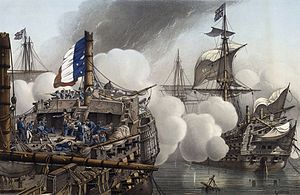HMS Tonnant (1798)

HMS Tonnant at the Battle of the Nile, by Louis Lebreton.
|
|
| History | |
|---|---|
|
|
|
| Name: | Tonnant |
| Laid down: | November 1787 |
| Launched: | 12 October 1789 |
| Completed: | September 1790 |
| Honours and awards: |
|
| Captured: | By the Royal Navy on 2 August 1798 |
|
|
|
| Name: | HMS Tonnant |
| Acquired: | Captured on 2 August 1798 |
| Honours and awards: |
|
| Fate: | Broken up in March 1821 |
| General characteristics | |
| Class and type: | 80-gun Tonnant-class ship-of-the-line |
| Tons burthen: | 2281 3⁄94 (bm) |
| Length: | |
| Beam: | 51 ft 9 1⁄4 in (15.8 m) |
| Depth of hold: | 23 ft 3 in (7.1 m) |
| Sail plan: | Full rigged ship |
| Complement: | 700 |
| Armament: |
|
HMS Tonnant (French language: "Thundering") was an 80-gun ship of the line of the Royal Navy. She had previously been the Tonnant of the French Navy and the lead ship of the Tonnant class. Rear-Admiral Horatio Nelson captured her at Aboukir Bay off the coast of Egypt at the Battle of the Nile on 1 August 1798. She was taken into British service as HMS Tonnant. She went on to fight at the Battle of Trafalgar in 1805, during the Napoleonic Wars.
Tonnant was the flagship of Vice-Admiral Sir Alexander Cochrane during most of the campaign in the Chesapeake Bay during the simultaneous War of 1812 with the United States. On 13–14 September 1814 Francis Scott Key and John Stuart Skinner were dining aboard the ship after negotiations to release some captured prisoners, during the Battle of Baltimore. Key went on to write what later became the words to the American national anthem, The Star Spangled Banner after watching the British attack on Baltimore's Fort McHenry. Tonnant was broken up in 1821.
Tonnant fought in the battles of Genoa on 14 March 1795 and The Nile on 1 August 1798 under Aristide Aubert Du Petit Thouars. During the battle, she severely damaged HMS Majestic, causing nearly two hundred casualties, including 50 killed and 143 wounded. Among the dead was Majestic's captain, George Blagdon Westcott. Du Petit-Thouars, who had both legs and an arm shot off, commanded his ship until he died. Tonnant was the only French ship still engaged in the morning, with her colours flying, though aground. It was not until 3 August that she finally struck her colours.
...
Wikipedia
